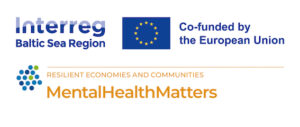MentalHealthMatters project partners explore social innovations related to psychosocial risks at work
The MentalHealthMatters Transnational Community of Practice gathered for a workshop in Stockholm, hosted by the NDPHS Secretariat. The participants explored practices related to psychosocial work environments across the Baltic Sea Region. Promising examples from Estonia, Finland, Latvia, Norway, and Poland were presented and the goal was to examine how social innovations in this field have facilitated behavioural and organisational changes in workplaces.
Estonian workplaces awarded with a Golden Label for mental health initiatives
In Estonia, the non-profit organization Peaasi.ee, dedicated to promoting mental health and reducing stigma, annually awards certifications to workplaces that prioritise mental well-being. The initiative encourages organisations to reflect on their work environments through the lens of mental health and motivates employers to take intentional steps toward creating workplaces that support mental health and well-being of people.
In 2024, 100 employers received one of four labels – golden, silver, bronze or emerging – based on their commitment to the cause.
Read more: https://peaasi.ee/vaimse-tervise-margis/
Finland’s pioneering work ability support system
Finland has long been a leader in supporting people’s ability to cope with their work. Central to this system is preventing work incapacity, for example, by ensuring preventive occupational health care for all workplaces and subsidising preventive work in small workplaces.
Supervisors play a critical role in early intervention, identifying when employees may need additional support. Finland’s early support model obliges employers to develop practices that address factors that may hinder work ability. The practices are created in collaboration with employers, employees, and occupational health services, and serve as a guideline for supervisors in their everyday work.
Read more: https://www.ttl.fi/teemat/tyoterveys/tyoterveyshuolto/tyokyvyn-tuki/tyokyvyn-varhainen-tuki (in Finnish)
Latvia’s Strādā Vesels encourages preventive action
The online platform Strādā Vesels supports Latvian employers and occupational safety specialists in planning and taking preventive actions that support employees’ health and well-being. It aims to raise awareness among these target groups, improve safety practices, and provide access to evidence-based tools. The initiative is driven by the Ministry of Labour, State Labour Inspection, and the Institute of Occupational Safety and Environmental Health.
Since 2010, Strādā Vesels has curated 13,000 evidence-based resources and has provided 1,360 training sessions on a variety of different topics related to the work environment. Around 15-20% of the provided seminars are about psychosocial risks or mental health at work. The platform has helped improve compliance with safety regulations and, hence, workplace safety standards.
Read more: https://www.stradavesels.lv/ (in Latvian)
Increasing industry-specific knowledge through the Norwegian Work Environment Initiative
In Norway, the public occupational safety and health authorities have collaborated with social partners to address challenges related to work environments, focusing on psychosocial, organisational, and ergonomic factors. The aim is to reduce sickness absence by increasing knowledge of industry-specific challenges and providing research-based tools.
The Work Environment Portal helps small and medium-sized businesses to work systematically on creating a healthy workplace, highlighting the importance of psychosocial factors. Covering 29 industries, it provides research-supported tools and assistance tailored to a variety of needs and challenges across the sectors. The initiative emphasises collaboration among leaders, safety representatives and labour union representatives in fostering a positive work environment.
Read more: https://www.arbeidsmiljoportalen.no/ (in Norwegian)
A Polish company has stepped in to fill a service gap in the occupational safety and health system
Makówkapracuje is a private Polish initiative that promotes a holistic, strategic, and systemic approach to workplace health and safety among employers, HR personnel, and safety service employees. It supports the management of psychosocial risks through awareness raising, training, and practical tools.
The company has become well-known in Poland for its strong social media presence and diverse services. Notably, they popularised the ISO45003 standards for managing psychosocial risks in safety services. Additionally, their step-by-step #dobrzewpwacy model guides managers in manufacturing companies in developing and implementing strategies for addressing psychosocial factors.
Read more: https://makowkapracuje.pl/ (in Polish)

Facilitating lasting impact in the workplaces
After hearing the stories of these social innovations, the Transnational Community of Practice observed that their successful implementation has been heavily shaped by contextual factors such as political decisions, legislation, and societal trends. To maximise their potential, social innovations need sustained and long-term commitments. Effective communication and promotion have also been crucial for raising awareness and ensuring that these good practices have gained traction. Without widespread recognition, even the most promising initiatives may struggle to make a lasting impact.
Visit project page: https://interreg-baltic.eu/project/mentalhealthmatters/
MentalHealthMatters receives financial support from the Interreg Baltic Sea Region and is co-funded by the European Union.
